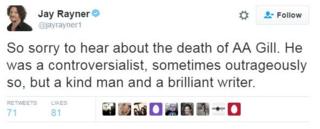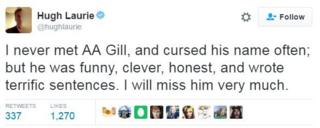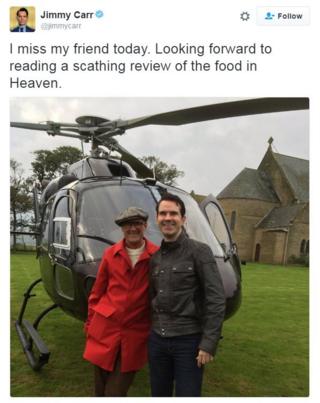AA Gill: Sunday Times critic dies after cancer diagnosis – BBC News

 Image copyright Getty Images
Image copyright Getty Images Sunday Times restaurant critic AA Gill has died, aged 62, three weeks after revealing he had cancer.
The columnist told the newspaper last month that he had been diagnosed with the “full English” of cancers.
Gill, who had been having chemotherapy, said that he did not “feel cheated” and had been “very lucky” in his life.
Sunday Times editor Martin Ivens said Gill had been “a giant among journalists” and the “heart and soul” of the paper he joined in 1993.
The final column by Gill, about coming to terms with his diagnosis, will be featured in tomorrow’s Sunday Times.
‘Dazzling and fearless’
In a statement sent to staff on Saturday, Mr Ivens said: “It is with profound sadness that I must tell you that our much-loved colleague Adrian Gill died this morning.
“Adrian was stoical about his illness, but the suddenness of his death has shocked us all.”
He added: “He was the heart and soul of the paper. His wit was incomparable, his writing was dazzling and fearless, his intelligence was matched by compassion.
“Adrian was a giant among journalists. He was also our friend. We will miss him.”
Writing about his illness in November, Gill had said he had “an embarrassment of cancer, the full English.
“There is barely a morsel of offal not included. I have a trucker’s gut-buster, gimpy, malevolent, meaty malignancy.”
Writers, broadcasters and journalists have paid tribute to the published author, who was known for dictating his copy over the telephone due to his dyslexia.
Jay Rayner, the broadcaster and writer, tweeted that Gill had been a “controversialist” but also “a kind man and a brilliant writer”.
Sunday Times political editor Tim Shipman described Gill as “the writer who first made me buy the Sunday Times”.
“The best of us for 30 years has died. Very sombre mood in the office,” he added.
 Image copyright @jayrayner1
Image copyright @jayrayner1  Image copyright @afneil
Image copyright @afneil  Image copyright @hughlaurie
Image copyright @hughlaurie Times Literary Supplement editor Stig Abell tweeted that Gill had been “the first journalist I learned to recognise purely from his style”.
John Witherow, editor of the Sunday Times from 1994 to 2012, said Gill had been extraordinary and unique.
“In all the years I was editor of The Sunday Times, he never once produced a boring sentence or a phrase that did not shine.”
Another former editor, Andrew Neil, added: “Hired AA for Sunday Times in 1993. He never forgot what he saw as huge favour. As one of finest writers of our time, he was doing the favour.”
Former Daily Mirror editor and TV presenter Piers Morgan tweeted that Gill had “trashed” him for 20 years, but always did so “with magnificently eloquent savagery” as well as “an irritating kernel of truth”.
AA Gill in print
- On Brexit – Wanting the country back is the constant mantra of all the outies… Of course I know what they mean. We all know what they mean. They mean back from Johnny Foreigner, back from the brink, back from the future, back-to-back, back to bosky hedges and dry stone walls and country lanes and church bells and warm beer and skittles and football rattles and cheery banter and clogs on cobbles.
- On his missing brother – We hugged. I think I said I loved him. I hope I did. And that was the last of him. Nothing. Not a hint, not a trace, not a court record, a hospital, not a Salvation Army bed, not a bank account, a credit card, not a passport, not a headstone
- On Cleethorpes – Cleethorpes’s strip of bacchanalian sin is a sorry and insipid little thing. It’s not Las Vegas, it’s not even lost property: a meagre high street that is, like most high streets in provincial towns, gasping for trade
- On a broth – The broth is a carnal riot: dozens of birds and animal bits, making up a suit with a blousy taste of shimmering nature, so vital it could bunga bunga in a bowl
- On bread and butter infused with yeast – “Oh,” said the Blonde, raising her eyebrows. “It tastes very, very … crotchish. Very masculine.” “Really? Well I never.” “Never?” “Well, never say never.”
While his writing remained popular, Gill’s articles often caused controversy.
In October 2009, he described how he had shot a baboon while in Tanzania, prompting outrage from animal rights groups.
In 1998, he described the Welsh as “dark, ugly little trolls” – a comment that was referred to the Commission for Racial Equality – while he once described Rhyl as “a town only a man driving a crane with a demolition ball would visit with a smile”.
‘England’s hernia’
In a critical review of a Norfolk pub, he referred to the county as the “hernia on the end of England”, while in 2006 he upset residents of the Isle of Wight by saying it “smelled of boiled washing”.
In 2010, he was censured by the former press watchdog having written a review of Clare Balding’s 2010 Britain by Bike TV programme, in which he described her as a “dyke on a bike”.
He was also once thrown out of one of Gordon Ramsay’s restaurants, along with his dining partner, actress Joan Collins.
 Image copyright @jimmycarr
Image copyright @jimmycarr  Image copyright @indiaknight
Image copyright @indiaknight  Image copyright @lionelbarber
Image copyright @lionelbarber Born in Edinburgh in 1954, Gill had overcome dyslexia to forge a career as a writer.
He went to the independent St Christopher School in Letchworth Garden City, Hertfordshire, and studied at the Central Saint Martins College of Art and Design and the Slade School of Fine Art, in London.
He began his writing career in the 1980s with art reviews for magazines, before writing for Tatler and then the Sunday Times.
His first marriage was to author Cressida Connolly in 1983. He married current Home Secretary Amber Rudd, who was then a venture capitalist, in 1991.
They had two children together – Flora and Alistair – but later divorced.
Gill’s illness had prompted his engagement to his partner of 23 years, Nicola Formby, with whom he also had two children – twins Edith and Isaac.
He said he had been “surprisingly excited” to be getting married to Ms Formby, who he often referred as “The Blonde” in his restaurant reviews.
Read more: http://www.bbc.co.uk/news/uk-38276456